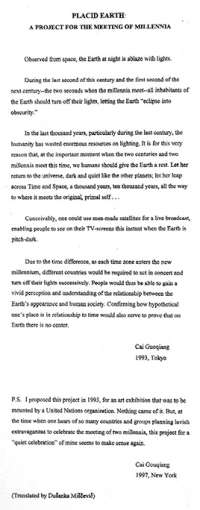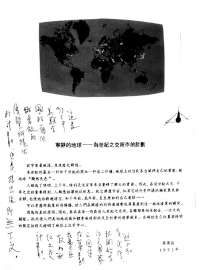Observed from space, the Earth at night is ablaze with lights.
During the last second of this century and the first second of the next century--the two seconds when the millennia meet-all inhabitants of the Earth should turn off their lights, letting the Earth "eclipse into obscurity."
In the last thousand years, particularly during the last century, the humanity has wasted enormous resources on lighting. It is for this very reason that, at the important moment when the two centuries and two millennia meet this time, we humans should give the Earth a rest. Let her return to the universe, dark and quiet like the other planets; let her leap across Time and Space, a thousand years, ten thousand years, all the way to where it meets the original, primal self. . .
Conceivably, one could use men-made satellites for a live broadcast, enabling people to see on their TV-screens this instant when the Earth is pitch-dark.
Due to the time difference, as each time zone enters the new millennium, different countries would be required to act in concert and turn off their lights successively. People would thus be able to gain a vivid perception and understanding of the relationship between the Earth's appearance and human society. Confirming how hypothetical one's place is in relationship to time would also serve to prove that on Earth there is no center.
Cai Guoqiang 1993, Tokyo
P.S. I proposed this project in 1993, for an art exhibition that was to be mounted by a United Nations organization. Nothing came of it. But, at the time when one hears of so many countries and groups planning lavish extravaganzas to celebrate the meeting of two millennia, this project for a "quiet celebration" of mine seems to make sense again.
Cai Gouqiang 1997, New York
(Translated by Dulanka Miscevic)
Observed from space, the Earth at night is ablaze with lights.
During the last second of this century and the first second of the next century--the two seconds when the millennia meet-all inhabitants of the Earth should turn off their lights, letting the Earth "eclipse into obscurity."
In the last thousand years, particularly during the last century, the humanity has wasted enormous resources on lighting. It is for this very reason that, at the important moment when the two centuries and two millennia meet this time, we humans should give the Earth a rest. Let her return to the universe, dark and quiet like the other planets; let her leap across Time and Space, a thousand years, ten thousand years, all the way to where it meets the original, primal self. . .
Conceivably, one could use men-made satellites for a live broadcast, enabling people to see on their TV-screens this instant when the Earth is pitch-dark.
Due to the time difference, as each time zone enters the new millennium, different countries would be required to act in concert and turn off their lights successively. People would thus be able to gain a vivid perception and understanding of the relationship between the Earth's appearance and human society. Confirming how hypothetical one's place is in relationship to time would also serve to prove that on Earth there is no center.
Cai Guoqiang 1993, Tokyo
P.S. I proposed this project in 1993, for an art exhibition that was to be mounted by a United Nations organization. Nothing came of it. But, at the time when one hears of so many countries and groups planning lavish extravaganzas to celebrate the meeting of two millennia, this project for a "quiet celebration" of mine seems to make sense again.
Cai Gouqiang 1997, New York
(Translated by Dulanka Miscevic)

